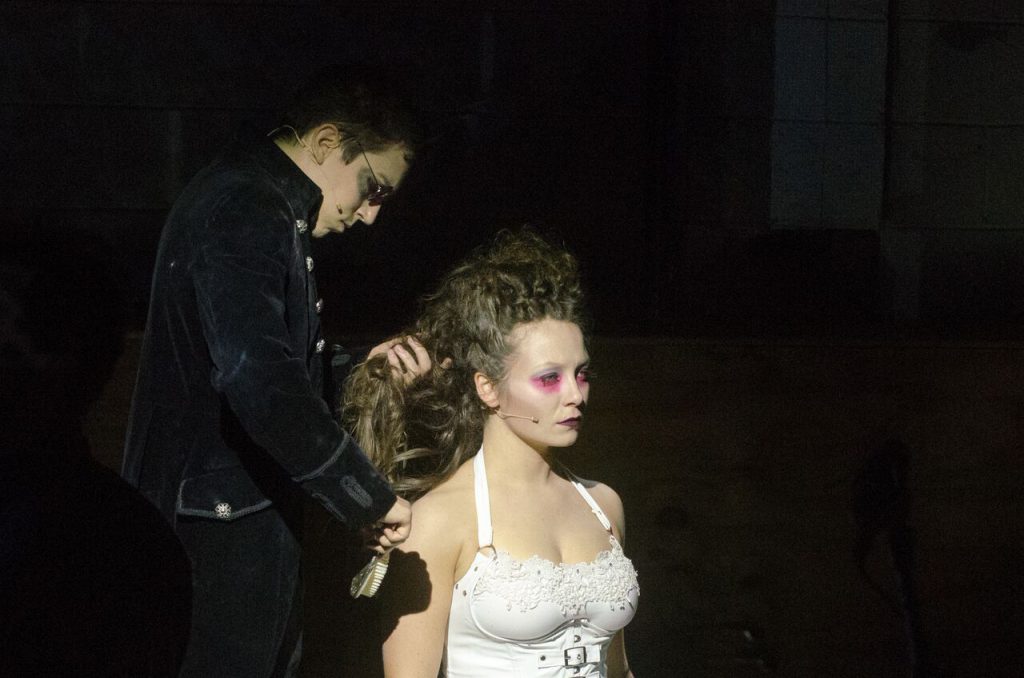Wolf Trap Opera offers a Terpsichorean, goth take on Glass’s “Fall of the House of Usher”

Jonas Hacker and Madison Leonard in Wolf Trap Opera’s production of Philip Glass’s “Fall of the House of Usher” at Dock 5, Union Square. Photo: Kim Witman
Those who believe opera should be a feast for the eyes as well as the ears likely reveled in Saturday evening’s sold-out performance of Philip Glass’s The Fall of the House of Usher at Wolf Trap Opera.
Glass, currently marking his 80th birthday season, adapted Edgar Allen Poe’s well-known short story of the same name as an opera in 1987, collaborating on the book with Arthur Yorinks, who also provided the lyrics.
The tale describes an aged, sentient mansion whose darkness seems to have infected its inhabitants, the brother and sister, Roderick and Madeline Usher. Glass’s compact, two-act opera is scored for four soloists and small chamber ensemble.
Yet the music was only about 40% of the production that the Halcyon Stage company mounted last night in collaboration with Wolf Trap Opera at Dock 5 of Union Market. The production was largely seized by the athletic, young artists of CityDance Conservatory—along with form-fitting goth costumes of Donna Breslin and an eclectic pastiche of projections from Brandon Morse.
The singers acquitted themselves admirably. Jonas Hacker’s tone and emotion were well suited to his portrayal of the neurasthenic Roderick. Despite some diction issues, Ben Edquist had moments when his plangent baritone was a pleasure as William. As Madeline, Madison Leonard’s wordless soprano, sometimes offstage, other times visible in the wings, added a haunting obbligato. Tenor Nicholas Nestorak made the most of his few vocal opportunities as the Physician.
Credit Wolf Trap Opera with the selection of Glass’s opera to display its ability to fuse art forms in this collaboration with Halcyon Stage—a company that states its artistic mission is to push creative limits as it fuses art forms for immersive performances.
On this night, its mission was accomplished, though at times with too much gusto. At times the 70-minute spectacle felt amorphous and unfocused, leaving the viewer to wonder if one was witnessing an opera with dance or a dance supplemented with opera.
Halcyon’s artistic director, Septime Webre, former artistic director of Washington Ballet, chose to tell the tale without sets and do so on a small, plain stage without a curtain or a backstage. It was a logical choice since he opted to fill up much of the stage with energetic dancing. The evocative choreography was an excellent complement to Glass’s motoric music, setting a ghostly tone without descending into camp. Joseph Li conducted with appropriate verve, leading members of the Inscape Chamber Orchestra, who dashed off Glass’s music with finesse.
Still at times, Webre’s choreography overwhelmed Glass’s opera, with nine dancers literally competing for space with the four singers on the modest stage. When Roderick and William are seated at dinner, Webre has four dancers jump up on the long, narrow table to execute rapid, intricate moves. With all that tabletop danger who could concentrate on the music or the words of the seated singers?
In the spirit of fusion the three lead singers had dance doppelgangers, as well as being called upon to dance themselves, mostly to good effect. Hacker, especially, moved extremely well, in a duet with his dance alter ego Mariano “Nano” Zamora.
